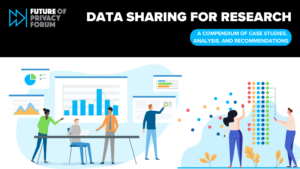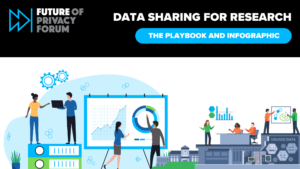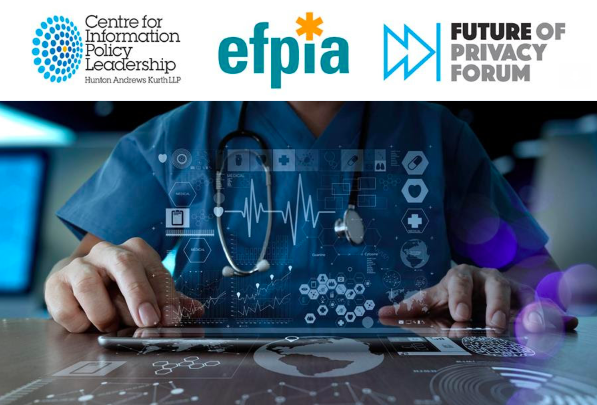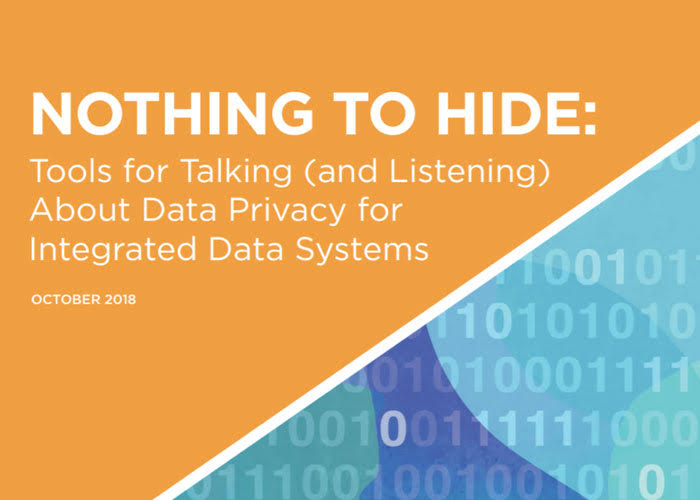Research often requires using sensitive data to answer important questions. The ethical collection and analysis of personal information can be challenging to do while still protecting the privacy of the implicated individuals, honoring informed consent, and complying with other legal obligations. The technology, policies, and ethical considerations for researchers are constantly shifting, sometimes making it difficult to keep up. That’s why FPF engages stakeholders across academia and industry to produce recommendations, best practices, and ethical review structures that promote responsible research. Our work is centered around streamlining, encouraging, and promoting responsible research that respects essential privacy and ethical considerations throughout the research lifecycle. FPF works with policymakers to develop legislative protections that support effective, responsible research with strong privacy safeguards, including hosting events that allow policymakers and regulators to engage directly with practitioners from academia, advocacy, and industry.
FPF also has an Ethics and Data in Research Working Group. This group receives late-breaking analysis of emerging legislation affecting research and data, meets to discuss the ethical and technological challenges of conducting research, and collaborates to create best practices to protect privacy, decrease risk, and increase data sharing for research, partnerships, and infrastructure. Learn more and join here.
Featured
Ethical and Privacy Protective Academic Research and Corporate Data
Is edtech helping or hindering student education? What effect does social media have on elections? What types of user interfaces help users manage privacy settings? Can the data collected by wearables inform health care? In almost every area of science, academic researchers are seeking access to personal data held by companies to advance their work. […]
FPF Research Coordination Network Helps Academic Stars Connect with Private Sector Privacy Pros at IAPP
The IAPP Global Privacy Summit convened many of the best minds in privacy from industry, government and civil society. To add to the mix, FPF brought six academic stars to the Summit to share their privacy research and insights, thanks to the Applied Privacy Research Coordination Network (RCN). Supported by the National Science Foundation, the […]
Municipal Leaders Joining Network to Advance Civic Data Privacy
Connected technologies and always-on data flows are helping make today’s cities and communities more livable, productive, and equitable. At the same time, these technologies raise concerns about individual privacy, autonomy, freedom of choice, and institutional discrimination. How do we leverage the benefits of a data-rich society while giving members of our community the confidence of […]
Fairness, Ethics, & Privacy in Tech: A Discussion with Chanda Marlowe
After beginning her career as a high school English teacher, Chanda Marlowe’s career change led her to become FPF’s inaugural Christopher Wolf Diversity Law Fellow. She’s an expert on location and advertising technology, algorithmic fairness, and how vulnerable populations can be uniquely affected by privacy issues. What led you to the Future of Privacy Forum? I […]
FPF Comments on the California Consumer Privacy Act (CCPA)
On Friday, the Future of Privacy Forum submitted comments to the Office of the California Attorney General (AG), Xavier Becerra. Read FPF’s Full Comments (11-page letter) See Attachment 1: Comparing Privacy Laws: GDPR vs. CCPA See Attachment 2: A Visual Guide to Practical De-identification In FPF’s outreach to the AG, we commended the office for its […]
FPF, EFPIA, and CIPL Workshop Report Now Available: "Can GDPR Work for Health Scientific Research?"
On October 22, 2018, the Future of Privacy Forum (FPF), the European Federation of Pharmaceutical Industries and Associations (EFPIA), and the Centre for Information Policy Leadership (CIPL) hosted a workshop in Brussels, “Can GDPR Work for Health Scientific Research?” to discuss the processing of personal data for scientific research purposes under the European Union’s General Data Protection Regulation (GDPR).
New FPF Study Documents More Than 150 European Companies Participating in the EU-US Data Transfer Mechanism
New FPF Study Documents More Than 150 European Companies Participating in the EU-US Data Transfer Mechanism EU Companies’ Participation Grew by One Third Over the Past Year By Jeremy Greenberg Yesterday, the European Commission published its second annual review of the EU-U.S. Privacy Shield, finding that “the U.S. continues to ensure an adequate level of […]
Nothing to Hide: Tools for Talking (and Listening) About Data Privacy for Integrated Data Systems
Data-driven and evidence-based social policy innovation can help governments serve communities better, smarter, and faster. Integrated Data Systems (IDS) use data that government agencies routinely collect in the normal course of delivering public services to shape local policy and practice. They can use data to evaluate the effectiveness of new initiatives or bridge gaps between public services and community providers.
FPF Publishes Report Supporting Stakeholder Engagement and Communications for Researchers and Practitioners Working to Advance Administrative Data Research
The ADRF Network is an evolving grassroots effort among researchers and organizations who are seeking to collaborate around improving access to and promoting the ethical use of administrative data in social science research. As supporters of evidence-based policymaking and research, FPF has been an integral part of the Network since its launch and has chaired the network’s Data Privacy and Security Working Group since November 2017.
Taming The Golem: Challenges of Ethical Algorithmic Decision-Making
This article examines the potential for bias and discrimination in automated algorithmic decision-making. As a group of commentators recently asserted, “[t]he accountability mechanisms and legal standards that govern such decision processes have not kept pace with technology.” Yet this article rejects an approach that depicts every algorithmic process as a “black box” that is inevitably plagued by bias and potential injustice.















